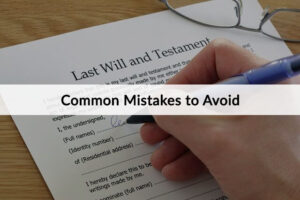
Whether you are working to pick an executor or you were named the executor of an estate, there is much to still be done. One of the most critical tasks is finalizing the will and distributing the assets. While this sounds relatively simple, it is a highly complicated process where numerous opportunities for mistakes occur.
With the honor and privilege of being named comes great responsibility, family disputes, deadlines, and the risk of finding yourself named in a lawsuit.
Many of these hassles of the job can be avoided just by understanding your role and the common mistakes others made before you. Knowing the issues to avoid can prevent hiccups in the estate’s administration and let you get back to your life and work as quickly as possible.
What Mistakes Do Executors of Plainview Estates Make the Most?
To err is human.
Only, in the case of an estate, you are dealing with high emotions, family members who may not have good relationships, and money. Those three issues combined to create a cesspool of contention. To not stir the pot, be sure you avoid these common executor mistakes:
Paying Estate Expenses Immediately
You are practicing your due diligence and assuming you are doing the job right by paying every outstanding bill immediately. However, not all bills are due, and in some cases, these expenses do not come from estate funds. Before you start writing checks and making payments, consult with an attorney.
Furthermore, if the deceased had an illness, more medical costs are likely to come through. And if you spend too much on expenses early on, it may offset the liquid assets.
Not Identifying All Assets of the Estate Correctly
One of the first tasks an executor does is locate and catalog all assets of the estate. When filing for probate, the executor will explain the assets found, their estimated value, and then identify which party receives them based on the will.
Some executors rush this process because the courts only allow so much time to issue a report to them. Doing so quickly means they overlook assets, and those assets then later must be disclosed to the court again. Missing assets the first time costs the estate and increases the wait time for beneficiaries. Furthermore, it may create liability issues with creditors, especially those who are affected by the oversight.
Distributing Assets Too Early
As an executor, you must distribute assets quickly and resolve the estate. But doing so before knowing the true scope of expenses only hurts you and the estate more.
You must administer timely, but also aim to pay all debts and liabilities first before distributing assets. Typically, an estate is administered within one year of the date of death. However, taxes, expenses, and other liabilities come first. If you were to distribute too early, and you did not hold onto sufficient estate funds to cover those liabilities, you would have to recoup funds from beneficiaries – which is almost impossible, in some instances. Often beneficiaries move, spend their inheritance, or become uncooperative.
Therefore, wait for all bills to apply. And if there are any outstanding medical costs still pending with insurers, wait for those to process so that you understand the full scope of expenses and know how much funds you need to reserve for them. You may be able to distribute certain assets while holding on to a reserve for any pending costs, but speak with an estate administration attorney first before doing so.
Waiting Too Long to Distribute
While you must be diligent and ensure you have the funds to pay for estate taxes and other debts, waiting too long is an issue as well. Not only will creditors and beneficiaries become anxious and possibly threaten lawsuits, but it can cost the estate unnecessary expense as you battle these claims in court.
Also, not administering an estate promptly could constitute a breach of your fiduciary duty, because you would not be acting in the best interest of the estate anymore. Beneficiaries can file a lawsuit against you, and you may pay from personal finances for any unnecessary costs inflicted on the estate due to your refusal to administer the estate.
Misinterpreting Terms of the Will
Unfortunately, a poorly written will leaves too much room for interpretation. It is the executor’s role to interpret the wishes of the deceased and carry out those wishes as they distribute the estate’s assets. If you misinterpret terms or blatantly ignore terms you disagree with, you may find a petition to remove you from your role and you could be personally liable for any costs associated with doing so.
Not Seeking Legal Counsel
One of the biggest mistakes executors make is not hiring an attorney at a reasonable time.
An attorney can help with the administration of the estate and with any tax filings or disputes, and ensure that the will is executed properly. Furthermore, an attorney helps protect the executor from the frivolous creditor and bitter beneficiary claims and can help protect them from being held personally liable for estate matters.
Need Assistance with Your Role as an Executor? Contact an Attorney in New York
New York probate courts are complicated, and your role as an executor can be overwhelming – especially if you have a life of your own.
Do not let the task of administering an estate affect your life. Instead, get the assistance you need and the guidance for navigating estate laws for New York. Speak with attorney Andrew M. Lamkin, P.C., today to explore your options.
You can schedule your free case evaluation now at 516-605-0625 or request more information online.
If you are currently writing a will and you would like assistance with your estate plan and designating an executor, the Law Office of Andrew M. Lamkin, P.C., can assist you as well. We are a full-service estate planning law firm that can help with everything from wills to trusts to Medicaid planning and estate litigation.


